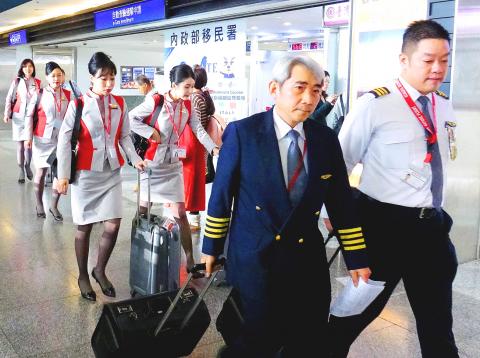Far Eastern Air Transport Corp (FAT, 遠東航空) is to halt operations from today due to long-standing losses and difficulty repaying loans, company vice president Huang Yu-chi (黃育祺) said yesterday.
The 62-year-old airline, which launched Christmas sales two days ago, made the announcement after it could not honor interest and principal payments on two short-term loans, Huang told a news conference in Taipei.
“The situation unfolded so suddenly that employees feel like they are in a nightmare,” he said, adding that management “are shocked, too.”

Photo: Chu Pei-hsiung, Taipei Times
FAT, which has 1,008 employees, would cancel all flights from today, he said.
It had notified the Taipei Department of Labor, he said.
An internal letter indicated that FAT planned to lay off its staff, Huang said, adding that it would do its best to protect employees’ rights while discussing labor issues with regulators.
FAT, which operated 62 routes to 47 destinations, focused on operations in the outlying counties of Penghu and Kinmen, as well as second-tier cities in China, including Hefei, Xiamen and Haikou, company data showed.
The closure came as no surprise to people in the aviation industry, a manager at another airline said on the condition of anonymity.
Although competition in the nation’s aviation market is tense, FAT’s failure has a lot to do with bad business strategy, he said.
FAT used old aircraft, which have poor fuel efficiency, the manager said, adding that it depended heavily on cooperation with travel agencies to offer charter services for groups, which has a low profit margin.
The average age of FAT’s fleet of 11 jets was 18.6 last year, much older than the industry average of 7.7, Civil Aeronautics Administration data showed.

US President Donald Trump yesterday announced sweeping "reciprocal tariffs" on US trading partners, including a 32 percent tax on goods from Taiwan that is set to take effect on Wednesday. At a Rose Garden event, Trump declared a 10 percent baseline tax on imports from all countries, with the White House saying it would take effect on Saturday. Countries with larger trade surpluses with the US would face higher duties beginning on Wednesday, including Taiwan (32 percent), China (34 percent), Japan (24 percent), South Korea (25 percent), Vietnam (46 percent) and Thailand (36 percent). Canada and Mexico, the two largest US trading

AIR SUPPORT: The Ministry of National Defense thanked the US for the delivery, adding that it was an indicator of the White House’s commitment to the Taiwan Relations Act Deputy Minister of National Defense Po Horng-huei (柏鴻輝) and Representative to the US Alexander Yui on Friday attended a delivery ceremony for the first of Taiwan’s long-awaited 66 F-16C/D Block 70 jets at a Lockheed Martin Corp factory in Greenville, South Carolina. “We are so proud to be the global home of the F-16 and to support Taiwan’s air defense capabilities,” US Representative William Timmons wrote on X, alongside a photograph of Taiwanese and US officials at the event. The F-16C/D Block 70 jets Taiwan ordered have the same capabilities as aircraft that had been upgraded to F-16Vs. The batch of Lockheed Martin

China's military today said it began joint army, navy and rocket force exercises around Taiwan to "serve as a stern warning and powerful deterrent against Taiwanese independence," calling President William Lai (賴清德) a "parasite." The exercises come after Lai called Beijing a "foreign hostile force" last month. More than 10 Chinese military ships approached close to Taiwan's 24 nautical mile (44.4km) contiguous zone this morning and Taiwan sent its own warships to respond, two senior Taiwanese officials said. Taiwan has not yet detected any live fire by the Chinese military so far, one of the officials said. The drills took place after US Secretary

THUGGISH BEHAVIOR: Encouraging people to report independence supporters is another intimidation tactic that threatens cross-strait peace, the state department said China setting up an online system for reporting “Taiwanese independence” advocates is an “irresponsible and reprehensible” act, a US government spokesperson said on Friday. “China’s call for private individuals to report on alleged ‘persecution or suppression’ by supposed ‘Taiwan independence henchmen and accomplices’ is irresponsible and reprehensible,” an unnamed US Department of State spokesperson told the Central News Agency in an e-mail. The move is part of Beijing’s “intimidation campaign” against Taiwan and its supporters, and is “threatening free speech around the world, destabilizing the Indo-Pacific region, and deliberately eroding the cross-strait status quo,” the spokesperson said. The Chinese Communist Party’s “threats